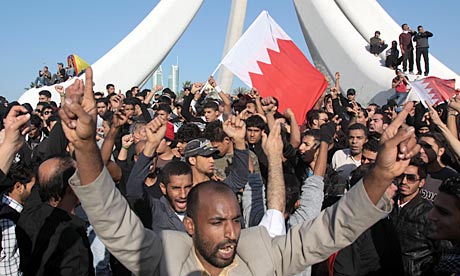WikiLeaks cables show no evidence of Iran's hand in Bahrain unrest

The United States has repeatedly dismissed claims by the Bahraini government that Shia Muslim unrest in the Gulf island state is backed by Iran. US diplomatic cables released by WikiLeaks show that the accusation made by the Manama government – which is facing street protests demanding political reforms from an opposition inspired by the Egyptian and Tunisian uprisings – is not backed by hard evidence. "Each time this claim is raised, we ask the GOB (government of Bahrain) to share its evidence," the US embassy reported in a secret dispatch in August 2008. "To date, we have seen no convincing evidence of Iranian weapons or government money here since at least the mid-1990s ... If the GOB had convincing evidence of more recent Iranian subversion, it would quickly share it with us." Bahrain, home to the US fifth fleet, is unique in the Gulf in having a Shia majority – 60-70% of the 500,000 strong population – ruled by the Sunni Al-Khalifa dynasty. The government has been concerned in recent years that any conflict with Iran would generate sympathy from the Shia population, the cables show. "Regional tensions may be adding to longstanding domestic tensions as well, contributing to the stridency of sectarian voices in Bahrain," US diplomats reported. "The majority of Bahraini citizens are part of the Shia underclass, and their grievances, expressed both in legal political activity and in street skirmishes between youths and police, are at the center of all domestic politics here." Earlier in 2008 the embassy described an atmosphere of simmering unrest: "Small but violent bands of Shia underclass youth, frustrated with persistent discrimination and what they perceive as too gradual a pace of reform, clash with police nearly every week. The Sunni minority, which rules the country and controls all security forces, has generally acted with restraint, but it takes only one mistake to provoke a potentially disastrous escalation." US officials also dismissed Bahraini allegations that the Iranian regime controls al-Haq, an extra-parliamentary Shia opposition movement involved in the current protests. Yet again, there was no "convincing evidence" for this. King Hamad told US diplomats that Bahrainis were receiving training from Hezbollah in Lebanon, "but admitted he had no definitive proof". Nor, despite US embassy requests, was there "convincing evidence" to back up speculation that the Syrian government was complicit in fostering subversion. Overall, however, the US view of the kingdom and its leader was positive. "King Hamad understands that Bahrain cannot prosper if he rules by repression," the US ambassador reported in December 2009. "Two election cycles have seen the integration of the Shia opposition into the political process. While a Shia rejectionist fringe continues to boycott the process, their influence remains limited as the mainstream Wifaq party has shown an ability to work with the government to achieve results for its constituents. "Discrimination against Shia persists, however, and the government has sought to deflect criticism by engaging with Wifaq and focusing more public spending on housing and social welfare projects. So long as Wifaq remains convinced of the benefits of political participation, the long-term outlook for Bahrain's stability is good." In a separate briefing for the visiting US director of national intelligence, Dennis Blair, the US ambassador reported: "King Hamad is personable and engaging. He rules as something of a 'corporate king', giving direction and letting his top people manage the government. He has overseen the development of strong institutions with the restoration of parliament, the formation of a legal political opposition, and a dynamic press. He is gradually shifting power from his uncle, prime minister Khalifa bin Salman Al Khalifa, who remains the head of the government, to his son, the crown prince. Crown Prince Salman received his high school education at the DOD school in Bahrain and earned a BA from American University in 1985. He is very western in his approach and is closely identified with the reformist camp within the ruling family – particularly with respect to economic and labour reforms designed to combat corruption and modernize Bahrain's economic base. King Hamad is committed to fighting corruption and prefers doing business with American firms because they are transparent. US companies have won major contracts in the past two years, including: Gulf Air's purchase of 24 Boeing 787 Dreamliners, a $5 billion joint-venture with Occidental Petroleum to revitalize the Awali field, and well over $300 million in foreign military sales." Bahrain's intelligence co-operation with the US was described as "excellent".

ليست هناك تعليقات:
إرسال تعليق